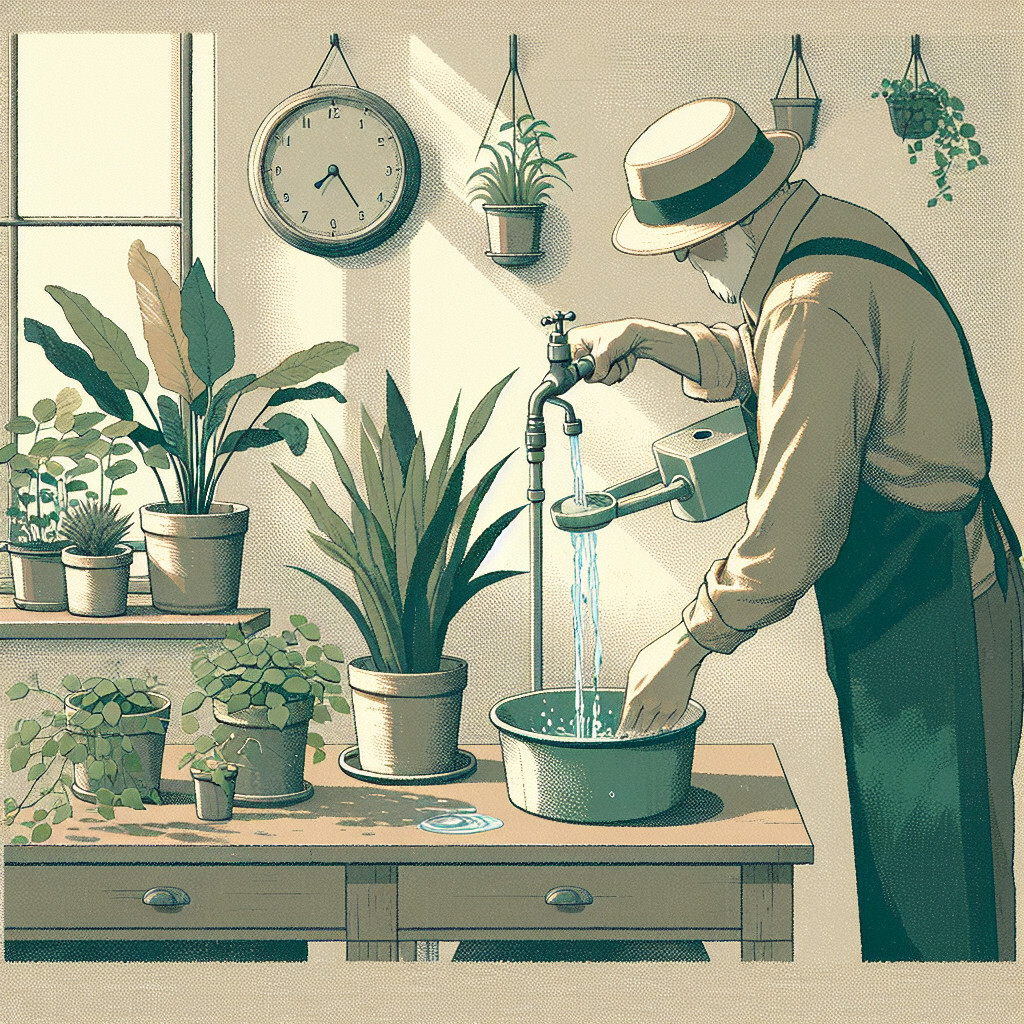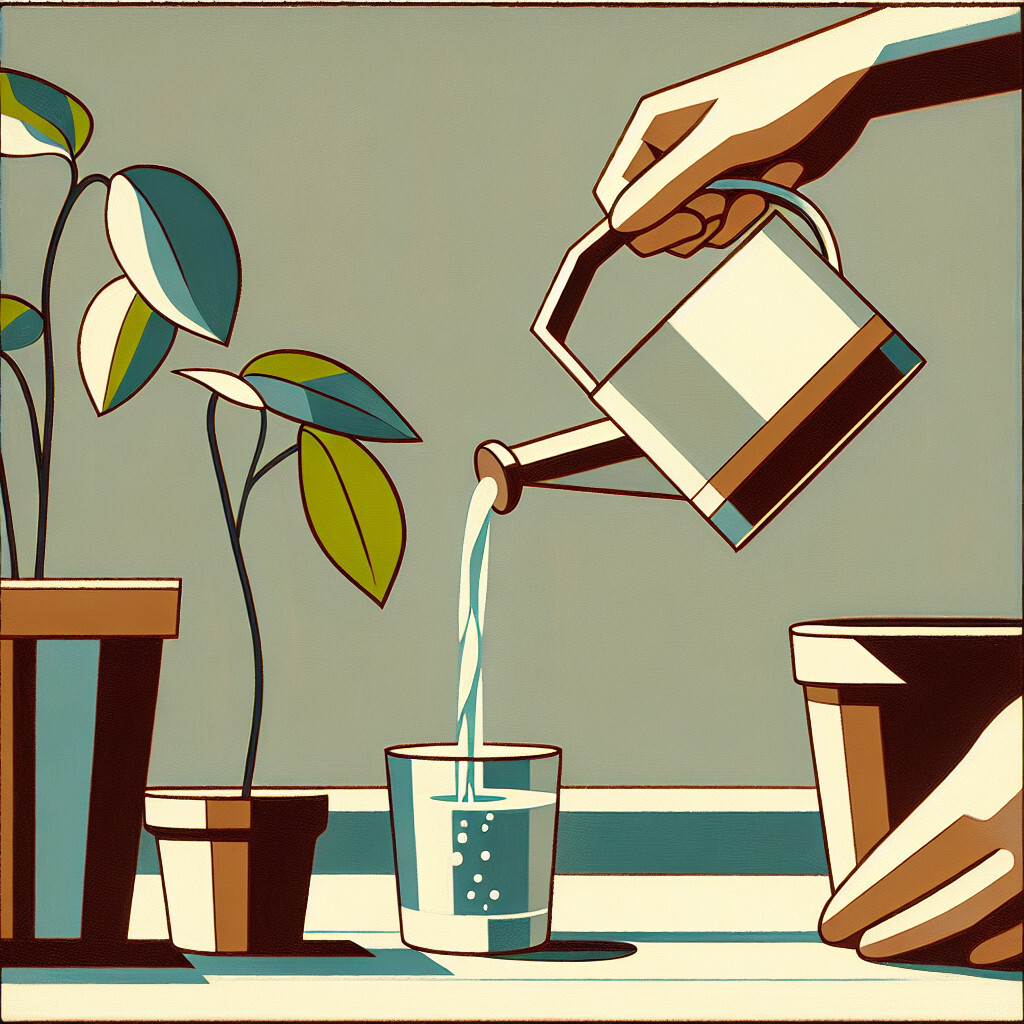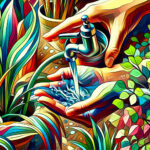-
Table of Contents
“Tap into Life: Hydrate Your Houseplants Naturally!”
Introduction

Using tap water for houseplants is a common practice among many homeowners and gardening enthusiasts. This method involves utilizing the readily available water from household taps to hydrate and nourish indoor and outdoor plants. While it is a convenient and cost-effective method, the suitability of tap water for plants can vary based on factors such as water hardness, chlorine content, and pH levels. These factors can significantly impact the health and growth of the plants. Therefore, understanding the properties of tap water and its effects on different types of houseplants is crucial for effective plant care.
Understanding the Effects of Tap Water on Houseplants
Understanding the effects of tap water on houseplants is crucial for any indoor gardener. The type of water used can significantly impact the health and growth of your plants. While many people use tap water for their houseplants without a second thought, it’s worth considering the potential implications this might have.
Tap water, in many areas, is treated with a variety of chemicals to make it safe for human consumption. These include chlorine, chloramines, and fluoride, among others. While these substances are harmless or even beneficial to humans, they can be detrimental to plants. Chlorine, for instance, can cause leaf tip burn, a condition where the tips of leaves turn brown and die. Chloramines, a combination of chlorine and ammonia, can also be harmful to plants, particularly those that are sensitive or already stressed. Fluoride, too, can cause damage to some plants, leading to symptoms such as leaf tip burn and leaf yellowing.
In addition to these chemicals, tap water often contains minerals like calcium, magnesium, and sodium. These minerals can build up in the soil over time, affecting its structure and potentially leading to problems like nutrient lockout, where the plant is unable to absorb the nutrients it needs. This is particularly a concern for plants that prefer acidic soil, as the minerals in tap water can make the soil more alkaline.
However, it’s important to note that not all tap water is the same. The quality and composition of tap water can vary greatly depending on the location. In some areas, tap water may be perfectly safe for plants, while in others, it may be best to avoid it. It’s also worth noting that many plants are quite resilient and can tolerate less-than-ideal water conditions.
If you’re concerned about the effects of tap water on your houseplants, there are a few steps you can take. One simple solution is to let the tap water sit out for 24 hours before using it. This allows the chlorine to evaporate, making the water safer for your plants. Alternatively, you can use a water filter to remove harmful chemicals and minerals.
Another option is to use distilled or rainwater. Distilled water has had all minerals and impurities removed, making it very safe for plants. Rainwater, too, is generally safe for plants, although it’s worth noting that it can sometimes contain pollutants, particularly in urban areas.
In conclusion, while tap water is a convenient option for watering houseplants, it’s important to be aware of the potential effects it can have. By understanding the composition of your tap water and taking steps to mitigate any potential harm, you can ensure that your houseplants remain healthy and vibrant. Whether you choose to use tap water, filtered water, or rainwater, the key is to be mindful of your plants’ needs and adjust your watering practices accordingly.
How to Safely Use Tap Water for Your Indoor Plants
Using tap water for houseplants is a common practice among many indoor gardeners. However, it’s essential to understand that not all tap water is created equal, and the quality can significantly impact the health and growth of your plants. This article will guide you on how to safely use tap water for your indoor plants.
Firstly, it’s crucial to understand the composition of your tap water. Tap water can contain various minerals, chemicals, and other substances that can affect your plants. For instance, tap water often contains chlorine, which is used to kill bacteria and other harmful organisms. While this is beneficial for humans, it can be detrimental to plants, especially sensitive ones. Therefore, it’s advisable to let tap water sit for 24 hours before using it on your plants. This allows the chlorine to evaporate, making the water safer for your plants.
Secondly, the hardness or softness of your tap water can also affect your plants. Hard water contains high levels of calcium and magnesium, which can build up in the soil and potentially harm your plants. On the other hand, soft water is treated with sodium, which can also accumulate in the soil and damage your plants. If you’re unsure about the hardness of your water, you can have it tested or use a home testing kit. If your water is too hard or soft, consider using filtered or distilled water instead.
Another factor to consider is the pH level of your tap water. Most houseplants prefer slightly acidic to neutral pH levels, between 6.0 and 7.0. However, tap water can sometimes be slightly alkaline, which can interfere with your plants’ ability to absorb nutrients. You can test the pH level of your water using a pH testing kit. If your water is too alkaline, you can add a little vinegar to lower the pH level, making it more suitable for your plants.
It’s also worth noting that some plants are more tolerant of tap water than others. For example, snake plants and spider plants are known for their hardiness and can usually handle tap water quite well. However, other plants, like orchids and African violets, are more sensitive and may require distilled or rainwater. Therefore, it’s essential to research the specific water requirements of your plants.
Lastly, always observe your plants for any signs of distress. If your plants’ leaves start to turn yellow or brown, or if they begin to wilt, this could be a sign that the tap water is not suitable for them. In such cases, it might be best to switch to a different water source.
In conclusion, while using tap water for houseplants is convenient and cost-effective, it’s important to ensure that it’s safe for your plants. By understanding the composition of your tap water, adjusting its hardness and pH level if necessary, and observing your plants for any signs of distress, you can successfully use tap water for your indoor plants. Remember, the health and growth of your plants depend on the quality of the water you provide, so it’s worth taking the time to get it right.
The Pros and Cons of Using Tap Water for Houseplants
Water is a fundamental requirement for the growth and survival of houseplants. However, the type of water used can significantly impact the health and vitality of these plants. One common source of water for houseplants is tap water. While it is readily available and convenient, using tap water for houseplants has its pros and cons.
On the positive side, tap water is easily accessible and cost-effective. It eliminates the need for purchasing expensive bottled water or installing a rainwater collection system. This makes it a practical choice for many indoor gardeners. Additionally, tap water often contains beneficial minerals like calcium, magnesium, and potassium, which are essential for plant growth. These minerals can supplement the nutrients provided by the soil, promoting healthier and more robust plants.
Moreover, tap water is typically treated and sanitized, reducing the risk of harmful pathogens that could potentially damage or kill houseplants. This is particularly beneficial for delicate or sensitive plants that may be more susceptible to disease. Furthermore, using tap water can be more environmentally friendly than bottled water, as it reduces plastic waste and the energy used in bottling and transportation.
However, despite these advantages, using tap water for houseplants also has its drawbacks. One of the main concerns is the potential presence of chlorine and other chemicals used in water treatment processes. While these substances are safe for human consumption, they can be harmful to plants, especially when used over a long period. Chlorine can inhibit plant growth and cause leaf burn in high concentrations. Some plants are more sensitive to these chemicals than others, so it’s essential to know your plants’ specific needs and tolerances.
Another issue with tap water is its potential hardness or softness. Hard water contains high levels of calcium and magnesium, which can build up in the soil and lead to nutrient imbalances. On the other hand, soft water is often high in sodium, which can be toxic to plants. Both situations can lead to poor plant health and growth.
Furthermore, the pH level of tap water can also be a concern. Most tap water tends to be slightly alkaline, while many houseplants prefer slightly acidic conditions. Over time, using alkaline tap water can alter the soil’s pH, affecting nutrient availability and potentially harming the plants.
In conclusion, while using tap water for houseplants offers convenience and cost-effectiveness, it also presents potential challenges. The presence of chemicals, the hardness or softness of the water, and the pH level can all impact plant health. Therefore, it’s crucial to understand your specific plants’ needs and consider these factors when deciding on the best water source. If tap water is your primary choice, consider letting it sit out overnight to allow chlorine to evaporate or using a water filter to remove harmful chemicals. Regularly check the health of your plants and adjust your watering practices as necessary to ensure they thrive.
Tap Water vs. Distilled Water: Which is Better for Your Houseplants?
Water is a fundamental requirement for the growth and survival of houseplants. However, the type of water used can significantly impact the health and vitality of these plants. Two common types of water used for houseplants are tap water and distilled water. The question that arises is: which is better for your houseplants?
Tap water is the most readily available and convenient source of water for many homeowners. It is rich in minerals such as calcium, magnesium, and potassium, which are essential for plant growth. However, tap water also contains chemicals like chlorine and fluorides, which are added during the water treatment process to kill bacteria and other harmful microorganisms. While these chemicals are safe for human consumption, they can be detrimental to houseplants. Over time, these chemicals can build up in the soil, altering its pH and potentially harming the plant’s roots.
In addition, the hardness or softness of tap water can also affect its suitability for houseplants. Hard water contains high levels of calcium and magnesium, which can lead to mineral buildup in the soil. On the other hand, soft water is treated with sodium to remove these minerals, but the high sodium content can also be harmful to plants. Therefore, if you’re using tap water for your houseplants, it’s advisable to let it sit for a few hours before use. This allows the chlorine to evaporate, making the water safer for your plants.
On the contrary, distilled water is free from any minerals or chemicals. It is produced by boiling water and then condensing the steam back into a liquid. This process removes all impurities, making distilled water pure H2O. While this purity might seem beneficial, it can also be a disadvantage for houseplants. Plants need certain minerals for their growth and development, and these are absent in distilled water. Using distilled water exclusively can lead to mineral deficiencies in your plants, causing them to become weak and unhealthy.
However, distilled water can be beneficial for certain types of houseplants that are sensitive to chemicals and minerals. These include carnivorous plants, orchids, and air plants, which naturally grow in environments with pure water. For these plants, distilled water can mimic their natural habitat and promote healthy growth.
In conclusion, both tap water and distilled water have their pros and cons when it comes to watering houseplants. The choice between the two largely depends on the type of plants you have and the quality of your tap water. If your tap water is heavily treated or hard, it might be worth considering using distilled water or investing in a water filter. Alternatively, you can use a combination of tap and distilled water to provide your plants with the necessary minerals without the risk of chemical buildup.
Remember, the key to healthy houseplants is not just regular watering, but also providing them with the right type of water. By understanding the needs of your plants and the properties of different types of water, you can ensure that your houseplants thrive and add beauty to your home.
Q&A
1. Question: Is tap water safe for houseplants?
Answer: Yes, tap water is generally safe for houseplants. However, it can sometimes contain chlorine or other chemicals that some sensitive plants may not tolerate well.
2. Question: Can tap water harm my houseplants?
Answer: Tap water can potentially harm your houseplants if it contains high levels of chlorine, fluoride, or salts. These substances can build up in the soil and harm the plant over time.
3. Question: How can I make tap water better for my houseplants?
Answer: You can make tap water better for your houseplants by leaving it out overnight before using it. This allows chlorine to evaporate. Alternatively, you can use a water filter to remove chemicals.
4. Question: Can I use hard tap water for my houseplants?
Answer: Hard tap water, which is high in minerals, can be used for houseplants. However, it can cause mineral buildup in the soil over time. If your tap water is very hard, it may be better to use filtered or distilled water.
Conclusion
In conclusion, using tap water for houseplants is generally safe, but it depends on the quality of the local tap water. Some tap water may contain high levels of chlorine or salts which can be harmful to certain plants. Therefore, it’s recommended to know the quality of your tap water and the specific water requirements of your plants.






